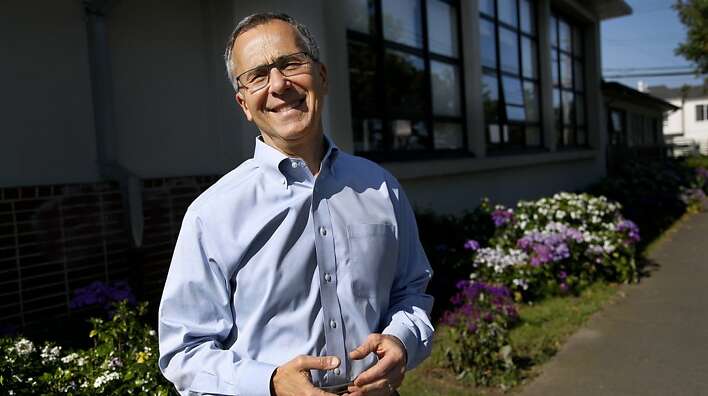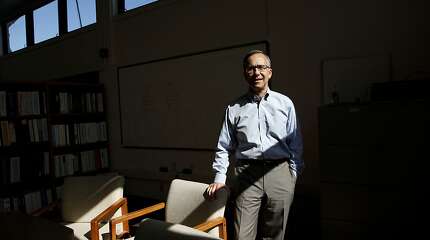
Preston Gannaway, Special To The Chronicle
Kevin Gogin, a San Francisco Unified School District program manager, says Jason Collins is a real-life role model.
Gay rights organizations and educators have worked for years, largely behind the scenes, to help smooth the way for Collins' disclosure. But now the harder work begins, say those who have been at the forefront of trying to eliminate homophobia in pro sports.
"I still get chills - I've got chills right now just talking about (Collins)," said Helen Carroll, a Mountain View resident who coached a women's college basketball team to a national championship and who has trained hundreds of coaches and administrators for years about dealing with gay athletes through the National Center for Lesbian Rights in San Francisco.
But while the initial cultural impact of Collins' coming out is significant, Carroll said, because "men's pro sports are god in this country," nobody should expect a flood of athletes to follow him out of the closet. "Maybe just a trickle, at first," she said.
"A lot of people, I know, are waiting and watching what the reaction is over the next few months," said Carroll, who leads the Sports Project at the National Center for Lesbian Rights.
The next step is focusing on leaders of professional sports leagues, says a year-old organization in San Francisco called the Last Closet, which is focused on eliminating homophobia in pro sports.
Even before Collins came out, the group had been trying to leverage public pressure to get commissioners of the major U.S. sports leagues not only to speak out against homophobia but to create a safety net for players - like Collins - who say they're gay.
So far, none of the commissioners has responded to the Last Closet's request for an on-camera testimonial about the subject. It has been organizing an online letter-writing campaign to league executives and team presidents, urging them to tackle the issue.

Preston Gannaway, Special To The Chronicle
Kevin Gogin says NBA player Jason
Collins' coming out "is just the punctuation, the exclamation part on
the sentence. It is up to us, as educators and a community, to write the
rest of the story. To keep it going."
Leagues take action
Still,
in recent months some pro leagues have started to take steps toward
more openly addressing homophobia in their ranks. Last month, the
National Hockey League announced a partnership with You Can Play, an
activist organization that promotes equality for all athletes,
regardless of their sexual orientation.It is run by Philadelphia Flyers scout Patrick Burke, whose brother Brendan came out in 2009 and died a year later in a car crash. Their father is Brian Burke, a longtime NHL executive who won the Stanley Cup as general manager of the Anaheim Ducks in 2007 and has been an outspoken gay rights advocate.
NBA Commissioner David Stern was supportive in the wake of Collins' disclosure, saying "Jason has been a widely respected player and teammate throughout his career and we are proud he has assumed the leadership mantle on this very important issue."
Two years ago, Stern fined one of the league's marquee players, Los Angeles Lakers guard Kobe Bryant, $100,000 for making an antigay slur on the court. This week, Bryant was one of the first players to support Collins publicly.
In the past, unspoken
That is another sign of progress to Carroll, 60, who came out 20 years
ago. When she coached the University of North Carolina-Asheville to the
1984 NAIA women's basketball championship, she said, "I don't think I
ever said the word, 'lesbian,' on campus." Her team knew she was gay and
so did school administrators but the subject was largely unspoken.Now, many educators hope Collins' example can help gay young people playing high school sports.
A nationwide survey of gay secondary school students found that 28 percent of them reported being "harassed or assaulted" while playing on a sports team because of their sexual orientation, according to the February survey by the Gay, Lesbian and Straight Education Network, also known as GLSEN.
Since 2011, the advocacy organization has run a sports program called "Changing the Game," which offers educators resources for connecting with LGBT students.
Continuing the story
About a year ago, the San Francisco Unified School District held a nationally pioneering training session for some of its coaches and administrators based on GLSEN's program."We had been hearing from some of our students about the homophobia they were exposed to around athletics," said Kevin Gogin, a school district program manager who has been working on gay and lesbian issues in education for more than two decades.
Collins' story will be helpful, Gogin said, because the NBA player provides gay students with a real-life role model.
But Collins "is just the punctuation, the exclamation part on the sentence," Gogin said. "It is up to us, as educators and a community, to write the rest of the story. To keep it going."
Read more: http://www.sfchronicle.com/politics/joegarofoli/article/Jason-Collins-paving-way-for-sports-progress-4487911.php#ixzz2SpGslHxC